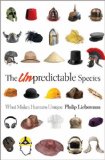new book – ‘The Long Evolution of Brains and Minds’ by Gerhard Roth
June 24, 2013
The Long Evolution of Brains and Minds by Gerhard Roth (Springer, 2013)
Book description from the publisher:
On the basis of evolutionary and behavioral biology, neuroscience and anthropology, this book investigates to which extent it is possible to reconstruct the evolution of nervous systems and brains as well as of mental-cognitive abilities, in short “intelligence”, and to which extent we can correlate the one with the other. One central question is, whether or not abilities exist that make humans truly unique, or whether the evolution of the human mind was a gradual process. Exactly which neural features make animals and humans intelligent and creative? Is it absolute or relative brain size or the size of “intelligence centers” inside the brains, the number of nerve cells inside the brain in total or in such “intelligence centers” decisive for the degree of intelligence, of mind and eventually consciousness? Which are the driving forces behind these processes?
Here, many different answers exist. For some experts the driving force for brains and minds are the conditions for biological survival: the more complex these conditions, the more effective need to be sense organs, nervous systems and brains, and the stronger is the tendency to an increase in learning abilities, behavioral flexibility and innovation power of animals. This is the ecological intelligence hypothesis. Other authors believe that the true driving force is the challenge from social life of an animal: the more complex the social conditions, the more sophisticated are abilities such as social learning, imitation, empathy, knowledge transfer, consciousness and the development of a theory of mind and meta-cognition. This, again, needs progressive changes inside the brains. This is the social intelligence hypothesis. Again other authors distinguish physical intelligence as a third form of cognitive functions mostly related to tool use, tool fabrication and understanding of the principles of how things work. Finally, some experts believe that the decisive factor in the evolution of brains and minds consisted in an increase in the speed and efficacy of information processing in cognitive brain centers. This is the general intelligence or information processing hypothesis. It is discussed, which of these hypotheses is the most convincing one. At its end, the book deals with the eminent question of whether we can arrive at a naturalistic concept of mind and consciousness. Is it possible to explain mind and intelligence within the framework of the natural science, or do mind and intelligence as found in humans, transcend nature?
See also: Table of Contents with more information at publisher’s website






